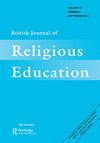特权和非特权机构——在宗教教育课堂上进行关于社会正义的教育
IF 0.7
2区 哲学
Q3 EDUCATION & EDUCATIONAL RESEARCH
引用次数: 0
摘要
摘要在宗教教育(RE)课堂上进行社会正义教育时,可以采取关于(概念和事实)、(增强承诺)、(协商实践)和(学生主导的行动)社会正义的教育形式。前三种方法用于芬兰城市初中的七门RE课程。其目的是找出不同的社会正义教育方法如何适合RE课程,以及这些方法创造了什么样的社会正义身份。社会正义身份是在课堂互动中构建的特权和代理程度的组合。分析表明,非特权身份通常被称为缺席和远程身份。机构的建设也经常不完整。例外情况是,教师故意以社会公正为原则进行教学,并鼓励学生批评学校的做法。他们提供了一种安全但有限的方式来解决无力感和促进学生代理。RE教室非常适合培养知情和关心的公民,但需要更多地关注培养能动性和解决少数民族身份问题。本文章由计算机程序翻译,如有差异,请以英文原文为准。
Privileged and non-privileged agencies – education about, into and with social justice in religious education classrooms
ABSTRACT When social justice education is conducted in religious education (RE) classes, it can take the forms of education about (concepts and facts), into (enhancing commitment), with (negotiating practices) and through (pupil-led action) social justice. The first three approaches were used in seven RE lessons observed in urban Finnish lower secondary schools. The aim was to find out how different approaches to social justice education fit into RE classes and what kind of social justice identities these create. Social justice identities were combinations of the degrees of privilege and agency constructed in the classroom interaction. The analysis shows that non-privileged identities were often referred to as absent and remote. Construction of agency was also often left incomplete. The exceptions were the instances where the teacher intentionally taught with social justice and encouraged the pupils to criticise school practices. They provided a safe but limited way to address powerlessness and promote pupil agency. RE classrooms are well fitted for cultivating informed and concerned citizens but more attention needs to be paid to fostering agency and addressing minoritized identities.
求助全文
通过发布文献求助,成功后即可免费获取论文全文。
去求助
来源期刊

British Journal of Religious Education
Multiple-
CiteScore
2.60
自引率
12.50%
发文量
33
期刊介绍:
The British Journal of Religious Education (BJRE) is an international peer-reviewed journal which has a pedigree stretching back to 1934 when it began life as Religion in Education. In 1961 the title was changed to Learning for Living, and the present title was adopted in 1978. It is the leading journal in Britain for the dissemination of international research in religion and education and for the scholarly discussion of issues concerning religion and education internationally. The British Journal of Religious Education promotes research which contributes to our understanding of the relationship between religion and education in all phases of formal and non-formal educational settings. BJRE publishes articles which are national, international and transnational in scope from researchers working in any discipline whose work informs debate in religious education. Topics might include religious education policy curriculum and pedagogy, research on religion and young people, or the influence of religion(s) and non-religious worldviews upon the educational process as a whole.
 求助内容:
求助内容: 应助结果提醒方式:
应助结果提醒方式:


